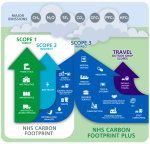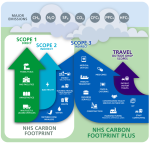How the UK are moving towards a more sustainable healthcare system
The NHS has set forth an ambitious commitment to combat climate change by achieving Net Zero carbon emissions. They plan to have two crucial categories to address: the emissions directly controlled by the NHS, known as the NHS Carbon Footprint, and those they can influence, the NHS Carbon Footprint Plus. For the NHS Carbon Footprint, the target is to reach Net Zero by 2040, with an interim goal of an 80% reduction by 2028 – 2032. With the NHS Carbon Footprint Plus, the aim is to achieve Net Zero by 2045, with an 80% reduction goal by 2036 – 2039.
Their intention is clear and sets a precedent for other healthcare infrastructures to follow in the fight against climate change.
The NHS’s carbon reduction plans are gradually evolving to meet the needs of present environments. In a bid to control emissions, the NHS are addressing carbon footprint production in different waves, including emissions stemming from travel. For both staff and patients, the NHS are promoting sustainable transportation options and incentivising the use of public transport or car sharing.
Image: NHS England, Greener NHS

Supplier Carbon Reduction
What are suppliers responsible for?
The NHS have placed a strong emphasis on supplier selection, with particular focus on Extended Producer Responsibility, EPR; and the mandating of submissions of Carbon Reduction Plans, CRP. By carefully scrutinising their suppliers and favouring those with more sustainable practices, they are actively contributing to the decarbonisation of processes within the healthcare system.
What is EPR?
Extended Producer Responsibility (EPR) is a pivotal concept in sustainable waste management. EPR is a policy approach that shifts the responsibility for the entire life cycle of a product, including its disposal and recycling, from the consumer and local governments back to the producer or manufacturer. This means that those who create products are held accountable for managing their environmental impact, particularly in terms of waste generation and disposal. EPR policy require producers to financially contribute to the collection, recycling, and safe disposal of their products when they reach the end of their use. This approach not only encourages more intentional, sustainable product design, but also fosters the development of efficient recycling systems, ultimately reducing the environmental footprint of consumer goods and promoting a more sustainable and circular economy.
What are CRPs and what do they achieve?
Companies produce their own carbon reduction plans (CRPs) and are held accountable to them. Carbon reduction plans are comprehensive strategies aimed at reducing the emission of carbon dioxide and other greenhouse gases into the atmosphere to mitigate climate change and its associated impacts. Plans include data on current carbon emissions, their sources, and specific reduction goals. It outlines strategies and actions for emissions reduction, identifies responsible parties, and sets timelines for achieving targets.
These plans are a necessity, particularly when working as a supplier with the NHS. They demonstrate a commitment to reducing carbon emissions, aligning with the NHS’s sustainability goals and ensuring a responsible and sustainable partnership.




















